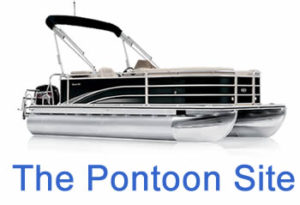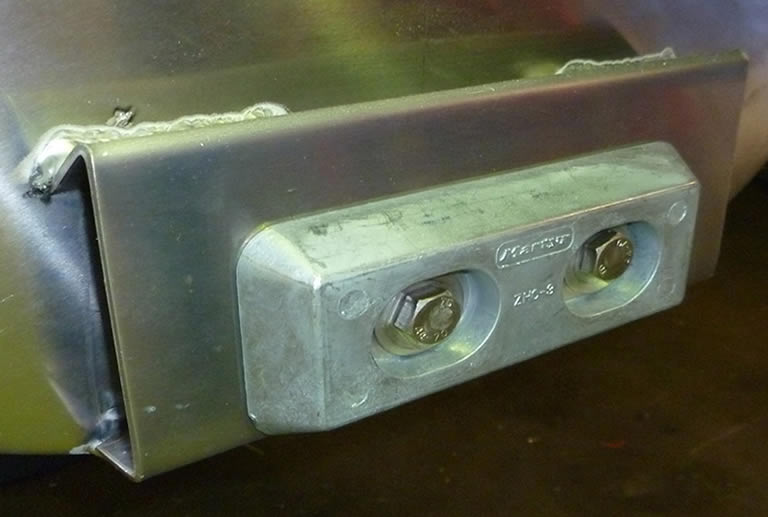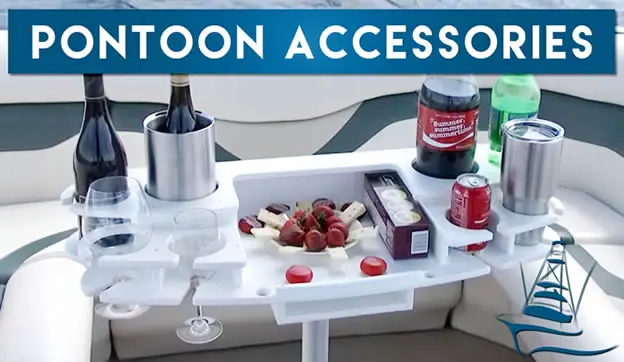If you own a boat then you will no doubt have heard of boat anodes. If you are not an ardent boat enthusiast then it’s doubtful you know what they are and what they do. In this article I show you when you need to install boat anodes as a safety measure against hull and prop corrosion.
Aluminum or zinc anodes are essential for boats that are used in saltwater, as galvanic corrosion damages aluminum quickly. However, galvanic corrosion also occurs in brackish water and freshwater, albeit at a slower rate.
Magnesium anodes are available to protect a boat from corrosion in freshwater. Fitting anodes to your pontoon boat (or any boat) is advisable as they are a cheap way of helping prolong the life of your boat and outboard.
What are anodes on a boat and how do they work?
Sacrificial anodes are small pieces of metal that are attached to the underside of a boat. Anodes work by attracting the forces that corrode metal in water before those forces can work on the metal on the boat or the outboard motor.
Thus they sacrifice themselves to protect the boat. Hence the name sacrificial anode. But how does this process work?
Well, it’s all about electrical currents in the water believe it or not.
Corrosion in water happens via an electric process known as galvanic corrosion.
Water is a conductive material meaning that electrical currents flow easily through it. Galvanic corrosion occurs when two different types of metal form an electrical current between each other in the water.
This electrical connection acts in a similar way to a battery. The conductive material, in this case the water, allows electrons to flow from the more active metal (the anode) to the lesser active one (the cathode). As the current flows, and thus the electrons move from the anode to cathode, the anode starts to deteriorate as it loses electrons.
Makes sense so far. Right?!
The boat anode (active metal that loses electrons and thus deteriorates) is just as vital component as the propeller, the propeller shaft or even the hull if you use your boat in saltwater.
To stop this corrosion from happening it is possible to attach a more electrically active metal to your boat (a sacrificial anode) so that the electron loss happens to that metal and not to other parts of your boat. You literally sacrifice the attached anode in order to protect other parts of the boat.
Obviously the sacrificial anode will corrode over time and therefore needs to be replaced regularly or you risk parts of your boat corroding. But, as long as you regularly replace the sacrificial anodes before they dissolve, the other less active metal components on your boat will remain protected from galvanic corrosion.
Different types of boat anodes for saltwater
Different types of galvanic corrosion occurs between different types of metals and in different types of water.
The type of sacrificial boat anodes you should fit to your boat will greatly depend on the materials the boat is constructed from and the type of water it is used in regularly.
For pontoon boat owners, the type of anodes you choose will greatly depend on how you use your pontoon boat.
Zinc boat anodes
Zinc anodes are the traditional types that were used on all boats before aluminum anodes became more readily available. This was simply because zinc was a more abundant material.
Pontoon boats that are used exclusively in saltwater can use zinc sacrificial anodes because they work so well in this type of marine environment. However, zinc does not offer protection in freshwater or even in brackish water making it a poor choice for pontoon boats and other vessels (such as a Jon boat) that are used mostly in inland waters.
Zinc is also not a very environmentally-friendly metal to use. Zinc is a fairly toxic metal that is harmful to the environment as it corrodes.
Additionally, zinc boat anodes are even more toxic than standard zinc metal. In order for zinc anodes to be most effective they must also contain some cadmium metal which is extremely toxic.
However, zinc boat anodes are very cheap and thus still widely used on both recreational and commercial vessels that boat in saltwater.
Cheap zinc anodes are available for pontoon boats and you can check them out here.
Aluminum boat anodes
Aluminum is the main material now used for most sacrificial boat anodes on both recreational and commercial vessels that are used in saltwater and brackish water.
Aluminum sacrificial boat anodes work really well on pontoon boats. Many people wonder why an aluminum anode would help protect a pontoon boat when the boat itself is made from aluminum. With both the hull and the anode being made from the same metal why would the anode erode quicker (lose its electrons faster) than the hull?
It’s because the aluminum in the anode has very different characteristics than the aluminum in the pontoon boat.
Modern aluminum sacrificial boat anodes are made using technology developed by the US Navy. The alloys in an aluminum anode are structured to be more electrically active than the aluminum used for constructing the boat.
As the aluminum in the anode is more electrical active than the aluminum in the boat this ensures the electrical currents created during galvanic corrosion only affect the aluminum alloy in the anode and not in the boat. We have some clever people in the navy.
These boat anodes are not only more electrically active than standard aluminum and zinc but they also last longer too.
Additionally, these modern aluminum boat anodes are constructed to have much less of an environmental impact by reducing the toxic activator in them without it affecting the performance of the anode. I told you the navy are smart!
Aluminum anodes are not just the choice for the navy they are also used by large commercial fishing and transportation fleets because they are so cost-effective and so good at what they do.
There are modern aluminum anode kits available that can be used to protect the hull of the pontoon boat and the outboard motor from galvanic corrosion.
Aluminum anodes should be your first choice if you plan to use your pontoon boat in either saltwater or brackish water as they offer the best protection in these type of waters. However, if you plan to stick to freshwater areas then you will need magnesium nodes instead.
Boat anodes for fresh water
There is currently only one fresh water anode available on the market.
Magnesium boat anodes are fresh water anodes
Magnesium boat anodes are the most electrically active anode on the market. They should be the first choice for pontoon boat owners who boat on inland bodies of water and also for most flat bottom boats that are used in rivers, creeks and freshwater lakes.
Magnesium boat anodes work in all water types but they erode so quickly in brackish water and saltwater that they are not a financially-friendly option. They are by far the best option for fresh water use though.
Magnesium anodes are known as fresh water anodes.
Magnesium anodes not only help protect a pontoon boat from corrosion but they are very environmentally-friendly because magnesium is a non-toxic metal. As the anode corrodes it will not impact the marine environment or fish.
As most inland bodies of water, where a pontoon boat would be used, are freshwater lakes, ponds, rivers etc., magnesium sacrificial anodes are the obvious choice.
Magnesium sacrificial anodes are readily available for pontoon boats and you can get them here.
Do aluminum pontoon boat need anodes?
Pontoon boats are great recreational vessels that are versatile enough to allow for a range of different activities. From shallow water fishing and slow lake cruising to fast water sports and stationary partying a pontoon boat can do it all.
But, as many boats need to have additional protection against corrosion some pontoon boat owners wonder of their vessel should be fitted with anodes. Does a your boat need anodes?
In order to understand if your pontoon boat needs to have anodes, which are more accurately called sacrificial anodes, we need to look at what these little pieces of metal are, what they are made from, and what their purpose is.
Why?
Because not all sacrificial anodes are made equal!
There are different types of boat anodes that are made to protect different boat materials in different marine environments.
So, should you fit pontoon anodes to your boat?
Should you bother with sacrificial boat anodes? Well, hopefully after reading the above information you have a pretty clear idea of how to answer that question. But I will attempt to answer it in a few short sentences.
If you intend to take an aluminum pontoon boat into saltwater then it is important you fit modern aluminum sacrificial anodes to the boat. Although zinc anodes work well in saltwater they don’t do so well in brackish water and offer no protection at all in freshwater. They are also very toxic to the environment.
For freshwater use attach magnesium anodes to your pontoon boat. These sacrificial anodes are the most electrically active and offer the most protection for your boat and outboard. Although magnesium anodes do work in brackish water and saltwater they erode too quickly to be a really viable option. Keep them for freshwater use only.
Magnesium is also a non-toxic metal that is very environmentally-friendly. This, and that fact that they work so well in freshwater, means that most pontoon boats should be fitted with magnesium sacrificial anodes as they are used most frequently in freshwater inland waterways.
Types of boat anodes to use & where to use them (chart)
Below is a quick view table for choosing which type of anode you need for your pontoon boat.
| Anode Type | Marine environment | ||||
|---|---|---|---|---|---|
| Metal | Saltwater | Brackish Water | Freshwater | Environmentally-friendly | |
| Zinc | ✔ | ✘ | ✘ | ✘ | |
| Aluminum | ✔ | ✔ | ✘ | ✔ | |
| Magnesium | ✘ | ✘ | ✔ | ✔ | |
You may also want to read our article on using a pontoon boat in rough water (which often accompanies saltwater – like the ocean) and also our article on other pontoon boat accessories.



